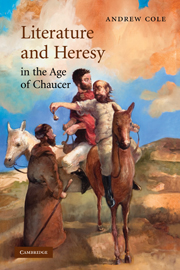Book contents
- Frontmatter
- Contents
- Preface
- Acknowledgments
- List of abbreviations
- PART I THE INVENTION OF HERESY
- PART II THE LATE FOURTEENTH CENTURY: CANONIZING WYCLIFFISM
- 2 The invention of “lollardy”: William Langland
- 3 The reinvention of “lollardy”: William Langland and his contemporaries
- Intermezzo: Wycliffism is not “lollardy”
- 4 Geoffrey Chaucer's Wycliffite text
- PART III THE EARLY FIFTEENTH CENTURY: HERETICS AND EUCHARISTS
- PART IV FEELING WYCLIFFITE
- PART V EPILOGUE
- Notes
- Bibliography
- Index of manuscripts cited
- General index
- CAMBRIDGE STUDIES IN MEDIEVAL LITERATURE
4 - Geoffrey Chaucer's Wycliffite text
Published online by Cambridge University Press: 22 September 2009
- Frontmatter
- Contents
- Preface
- Acknowledgments
- List of abbreviations
- PART I THE INVENTION OF HERESY
- PART II THE LATE FOURTEENTH CENTURY: CANONIZING WYCLIFFISM
- 2 The invention of “lollardy”: William Langland
- 3 The reinvention of “lollardy”: William Langland and his contemporaries
- Intermezzo: Wycliffism is not “lollardy”
- 4 Geoffrey Chaucer's Wycliffite text
- PART III THE EARLY FIFTEENTH CENTURY: HERETICS AND EUCHARISTS
- PART IV FEELING WYCLIFFITE
- PART V EPILOGUE
- Notes
- Bibliography
- Index of manuscripts cited
- General index
- CAMBRIDGE STUDIES IN MEDIEVAL LITERATURE
Summary
By the late 1380s, the Wycliffites were shadowed, as can be expected for any minority movement entering into public visibility and influence, by constructs – that of “lollardy” and the “lollard.” Some, such as bishops and orthodox preachers, used the word “lollard” to disparage the Wycliffites as “heretics” and, as a result, simplified the latter's own theological and sacramental program; in such instances, the very word often blocked from view what is unique about Wycliffism as an alternative Christianity. Yet others – from John Clanvowe to William Langland, from preachers preaching within the gray areas of medieval religion, to Wycliffites themselves – construed “lollardy” as an opportunity to elaborate upon those alternative Christianities, a rubric under which to draw distinctions between Wycliffite notions of lay discipleship and more longstanding fraternal forms of belief and practice on questions of poverty and apostleship. No matter their ideological origin, nearly all usages of “lollard” point to socio-symbolic problems – specifically, to the problems of audience and the ways in which persons see, hear, and name “lollards” in a sympathetic or hostile fashion. Such trends are in evidence up to the mid-fifteenth century, as in the work of that priest-poet, John Audelay. In most cases, when authors write about “lollardy,” they are referring to a social typology and imagining a newcomer to the scene of religion and politics, the kind of character who, for better or for worse, embroiders late medieval writing.
- Type
- Chapter
- Information
- Literature and Heresy in the Age of Chaucer , pp. 75 - 100Publisher: Cambridge University PressPrint publication year: 2008



